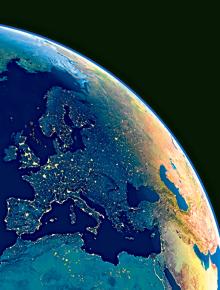
Has Europe seen the light on renewable energy?
Apr 9, 2010 - Geoffrey Lean - telegraph.co.uk
Geoffrey Lean looks at how likely a Europe powered entirely by renewable energy could be.
 |
A satellite image of Europe at night Photo: Science Photo Library |
Visionary accountants. There's an apparent oxymoron. To many, the all-powerful bean counters have destroyed much of my generation's imaginativeness, initiative, and enterprise. If economics is the dismal science, accountancy must be the cheerless profession.
Yet one of the most visionary – there is no other word – reports recently to cross my desk comes from a firm whose name is almost synonymous with accountancy. Just published, virtually unnoticed, by PricewaterhouseCoopers, it is the sort of tome you would expect from an idealistic green group. But given its source, and the practicality of its approach, it should be taken seriously.
It forms a blueprint for a Europe powered entirely by renewable energy – and yet more prosperous, more mobile, and using more electricity than now. Impossible, you may well say: vegan pie in the sunlit sky. How could a modern, industrial, highly developed continent even begin to survive if it was wholly dependent on such unreliable sources?
And yet the report not only recognises the inherent volatility and unpredictability of winds that only blow part of the time, and of sunlight that only reaches us on clear days, but tackles these issues head on: it says renewables could provide at least as secure an energy system as anything we have today. And, this week, an equally blue-chip study produced by a group including McKinsey, Imperial College, and the European Climate Foundation will come to much the same conclusion.
The secret, both studies report, lies in two concepts: diversity and connectivity. They envisage a continent-wide "supergrid" linking up the areas with "the best sites for each technology", as PricewaterhouseCoopers puts it, "regardless of national or regional borders". Thus the North Sea would contribute electricity from windpower, for example, the Iberian peninsular would generate it from the sun, and Norway and Austria would provide hydropower. The diverse sources would be connected by high-voltage, direct-current power lines, which would run mainly on existing national grid networks and be linked by undersea cables – much more efficient than our existing alternating-current lines.
The Norwegian and Austrian contributions would provide vital back-up since – unlike other renewable sources – hydropower can effectively store electricity by pumping water uphill to its reservoirs at times of surplus and generating power when needed by letting it rush downhill again. Denmark already relies on its Scandinavian neighbour in this way to cover its windpower – which can go from generating as much electricity as three large power stations to zero in just a few hours – and there is plenty still to spare.
There is even more potential if tide, wave and – especially – geothermal energy are developed, but the reports, conservatively, do not count on them at all. With them, an entirely renewable-powered Europe might be self-sufficient. Without them it would have to import about a fifth of its electricity from North Africa, mainly from its abundant solar energy, by 2050. This raises obvious concerns about energy security but, as the accountants' report puts it, there would be "a lower level of risk" than at present. Europe now imports little electricity, but buys in more than half of the fuels needed to generate it (ranging from 41 per cent of its coal to 97 per cent of its uranium), a proportion expected to rise to nearly three quarters over the next decades. And while it is now becoming increasingly dependent on Russia, which has already shown its willingness to disrupt supplies, the solar electricity would come from a range of North African states.
The cost, the reports agree, would be, at worst, little more than for continuing the present energy system, and the accountants conclude that consumers will eventually enjoy "considerable, and growing, savings".
The accountants do, however, point to one serious problem. Solar power stations need large amounts of water, but work best in arid areas with few clouds. Siting them by the sea would be one possible solution, and could produce desalinated water as a welcome by-product; but coastal areas tend to be more overcast.
The reports are not just setting out a dream; important building blocks for putting the concept into practice are beginning to appear on the ground. Big companies, including Deutsche Bank and energy giants RWE and E.ON, are already investing in a plan to provide 15 per cent of Europe's power from the Saharan sun, while nine North Sea governments are planning to link their electricity networks through a forerunner of the proposed supergrid.
Will Europe become all-renewable? It's hard to see it by 2050: nuclear power will surely also have a role. But the reports suggest that the continent could tackle climate change by decarbonising its power supplies – and maybe all its energy as electric cars and heating take over. And that would be a vision worth realising.

|